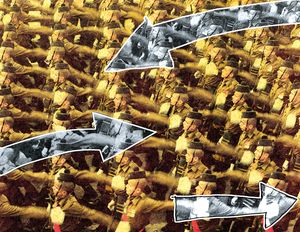A demonstrable vote bank for Narendra Modi was the fauji parivar, comprising serving and retired defence personnel and their families. The upsurge of support from those who are and were in uniform had several reasons. The reputation of the Modi government for muscularity in dealings with Pakistan, especially the surgical strikes and the air strikes on Balakot, expanded the support base.
The failure or success of the men in uniform to respond to terrorist attacks has been one of the reasons for a government losing or gaining popularity. However, even though the casualties for both the Army and the paramilitary forces have been on the higher side during the last five years in Kashmir, the responses, especially the political controversies surrounding the strikes, triggered a jump in support.
The tenures of two of Modi’s predecessors, Manmohan Singh and Atal Bihari Vajpayee, too, saw major terror attacks planned and executed from across the border. They, however, reaped contrasting results when they faced the electorate. There were two major terrorist strikes during Vajpayee’s six-year tenure—the hijacking of the Indian Airlines flight to Afghanistan, which forced the government to release terrorist leader Masood Azhar, and the attack on Parliament in which the attackers were killed by the security forces. Though Vajpayee mobilised the Army for Operation Parakram and massed the troops on the Pakistan border after the Parliament attack, the soldiers returned to their bases a few months later, without seeing any action. This led to disenchantment in the fauji parivar, which voted against the BJP in 2004.
Azhar’s banned organisation, Jaish-e-Mohammad, was among those which carried out the deadly strikes on Mumbai in November 2008. It resulted in many casualties, but the bravery of assistant sub-inspector Tukaram Omble in capturing heavily armed Pakistani terrorist Ajmal Kasab alive caught the nation’s attention. The martyrdom of Omble, joint commissioner Hemant Karkare and other men in uniform caused a patriotic surge, and the fauji parivar by and large voted for the United Progressive Alliance, helping the coalition win a majority on its own.
Yet, there has been a grouse that men and women who served in the armed forces, paramilitary forces and the state police did not get much recognition from the BJP or other parties. Modi’s selection of his first batch of ministers has made this disquiet a little more acute. Former Army chief V.K. Singh, who was reelected from Ghaziabad with a massive majority, retained his job as minister of state, but was shifted from the high-profile external affairs to road transport and national highways.
The bigger disappointment happened when retired colonel and Olympic medallist Rajyavardhan Singh Rathore was kept out of the first batch, because of reasons of regional representation from Rajasthan. Rathore had been an innovative minister in sports, youth services as well as information and broadcasting. But there are indications that he is likely to be given a bigger organisational role or will be under consideration when Modi expands his cabinet after the budget session of Parliament. Politicians who achieved high positions after serving in uniform include retired major Jaswant Singh, who rose to be the minister for defence, finance and external affairs as well as the deputy chairman of the Planning Commission. Another one is retired police officer Sushilkumar Shinde, who served as Union home minister, chief minister of Maharashtra and governor of Andhra Pradesh. The fauji parivar wants similar high recognition for its members who are in politics now.
sachi@theweek.in


